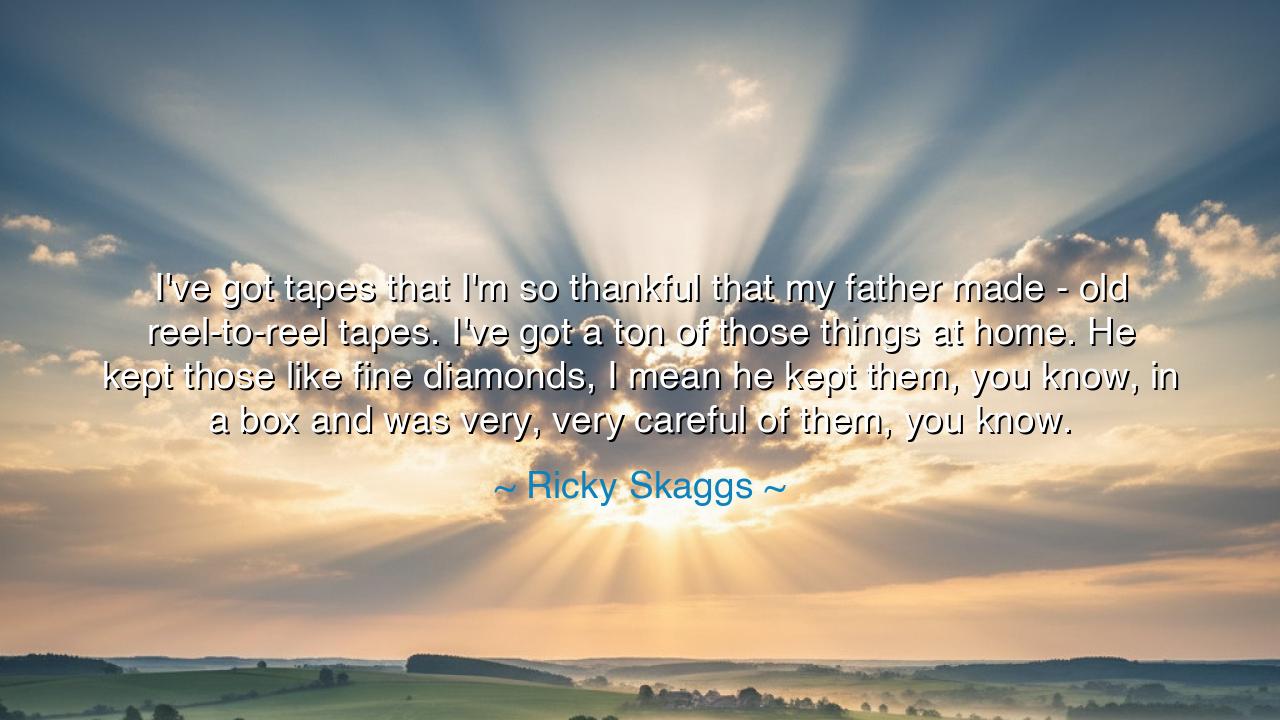
I've got tapes that I'm so thankful that my father made - old
I've got tapes that I'm so thankful that my father made - old reel-to-reel tapes. I've got a ton of those things at home. He kept those like fine diamonds, I mean he kept them, you know, in a box and was very, very careful of them, you know.






Ricky Skaggs, in his reflection upon the treasures of memory, declares: “I’ve got tapes that I’m so thankful that my father made—old reel-to-reel tapes. I’ve got a ton of those things at home. He kept those like fine diamonds, I mean he kept them, you know, in a box and was very, very careful of them, you know.” In these words shines the sacred bond between memory, heritage, and the father who preserves them. For these tapes are more than sound—they are vessels of time, carrying voices, songs, and echoes of a world that would otherwise fade into silence.
The ancients knew the importance of preservation. Before the age of machines and magnetic reels, memories were passed down by oral tradition, and families guarded stories as their most precious inheritance. Skaggs’ father, by tending to these reels “like fine diamonds,” follows in this ancient path. He becomes a guardian of the past, ensuring that the fragile voice of yesterday is not lost to the wind. Just as the Greeks treasured their epics and the Hebrews their psalms, so too did this father treasure the sounds of family and music, knowing they would nourish the generations yet to come.
These tapes, though ordinary in appearance, become treasures because of the care bestowed upon them. The father’s devotion—his careful placing of them in a box, his vigilance to protect them—transforms them from mere objects into sacred artifacts. It is not the reel alone, but the love and reverence with which it was guarded that makes them shine like diamonds. In this way, the lesson is profound: what gives value to memory is not only the content itself, but the devotion with which it is preserved.
History offers us a mirror in the story of the Irish monks during the Dark Ages. When much of Europe’s knowledge was threatened by war and ruin, these monks copied manuscripts by hand, treating each letter as if it were a jewel. Centuries later, their careful labor preserved the wisdom of civilizations that might otherwise have vanished. In the same spirit, Skaggs’ father, with his box of reels, performs a humble yet heroic act—saving the sound of life itself so that it may continue to speak long after the lips that made it are silent.
The words “I’m so thankful” reveal the heart of the son who now looks upon these recordings not merely as objects, but as gifts of immeasurable worth. Gratitude here is not fleeting—it is reverence. Skaggs acknowledges that his father’s foresight gave him more than tapes; it gave him a bridge to the past, a thread binding him to his roots, a continuity of spirit that endures through sound. This is a thanksgiving not only for the tapes, but for the father who understood their worth before the son himself could.
The lesson for us is clear: guard your memories, for they are the roots of identity. Do not despise the small acts of preservation—keeping letters, recording voices, saving stories—because one day they will shine brighter than jewels. Just as Skaggs’ father tended his reels, so must we tend the fragments of our own heritage, for without them we are adrift, but with them we are anchored to those who came before us.
Practically, this means taking time to preserve your own treasures: record the voices of your elders before they are lost; keep the letters and journals that capture the soul of your time; store photographs and music with care. And above all, share them with those who come after, teaching them to see in these things not clutter but legacy. In doing so, you become, like Skaggs’ father, a guardian of time, a keeper of diamonds hidden in simple boxes.
Thus, let this quote be remembered not merely as nostalgia, but as wisdom: that the careful preservation of memory is one of the noblest labors of love. For in the end, what we guard with devotion becomes the inheritance of the future, and what we treat as sacred will speak to generations yet unborn.






AAdministratorAdministrator
Welcome, honored guests. Please leave a comment, we will respond soon